
We speak of senility to describe an elderly person whose physical and mental faculties are jointly impaired. It is more precisely about all the physical and mental disorders that are linked to old age. This is why the term senility is often used in everyday language to precisely speak of old age.
Senility is precisely a deterioration in a person's state of health due to aging, which manifests itself in the degeneration of both tissues and organs of our body, as well as psychological abilities. This pathology affects both the physical and psychic faculties of a person, who is consequently very impaired intellectually and physically.
Eventually, senility requires the care of the affected elderly person and above all increased monitoring because his mental and physical faculties are seriously degraded to the point of becoming totally dependent.
Senility is usually caused by other serious degenerative diseases such as Alzheimer's disease.
The signs and symptoms of senility are varied as they affect both the body and the mind. Thus, the elderly affected can show changes in behavior, mood, and changes in everything related to the cognitive.
Some warning symptoms are deceptively similar to those of Alzheimer's disease, which is explained by an alteration of neurons. Senility, if it can be the consequence of this disease, is a different pathology that occurs with age and gradually deteriorates the mental and physical abilities of the affected person.
The first of the signs of senility is most often memory loss, and mainly that related to events that took place very shortly before. The senile elderly person generally no longer remembers what she has just said, she can no longer find her objects, or is no longer able to remember her upcoming appointments. His distant memory, on the other hand, is generally not affected.
Sleep disorders are also symptoms that should alert and suspect senility. If these types of disorders often occur with age, senility contributes to accentuate them. An elderly person suffering from senility can thus suffer from insomnia or lose the notion of sleep/wake rhythms, for example.
Senility is also manifested by the inability of the affected elderly person to perform certain actions or movements, more precisely to master them correctly. For example, she may be unable to dress herself, wash herself, go to the toilet, or take her meals without the help of another person. An elderly person who suffers from senility has the greatest difficulty in carrying out the usual acts of daily living if they are not helped.
Behavioral disorders are also part of the warning signs of senility. This can range from mood swings to personality changes, through aggression, even paranoia, that is, excessive distrust in the face of real or imagined threats. In any case, intense nervousness and irritability are among the symptoms that an elderly person with senility shows.
Finally, senility also causes disorders such as the impossibility of coordinating physical gestures, an imbalance in the movements of the elderly person, but also total disorientation when they are in a familiar environment.
If senility appears with aging, certain factors, particularly related to lifestyle, seem to increase the risk of this pathology occurring.
Thus, physical inactivity, overweight, poor diet, tobacco and alcohol consumption are aggravating factors. Diseases such as diabetes or hypertension can also be the cause of the occurrence of senility.